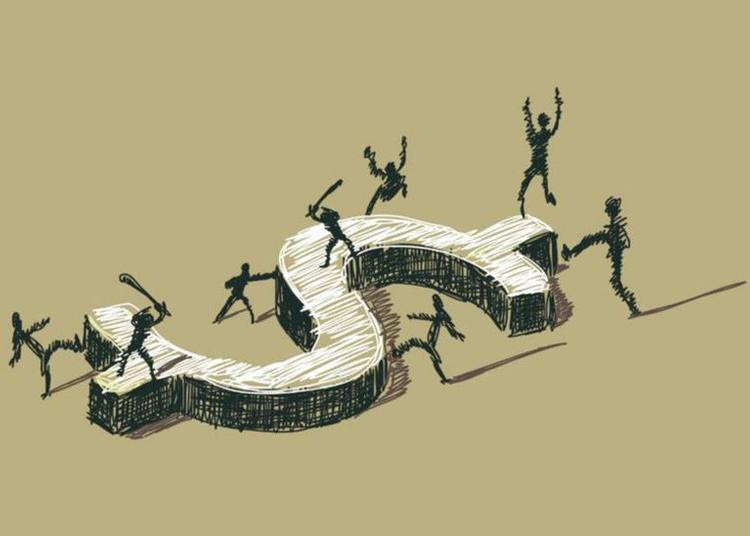We socialize bankruptcies. We should also socialize the successes
We socialize bankruptcies. We should also socialize successes
By Mariana Mazzucato: professor of innovation economics and public value, and director of the University College London Institute for Innovation and Public Purpose. She is the author of "The Value of Everything: Making and Taking in the Global Economy."
When the economy is in crisis, who do we ask for help? Not to companies, but to governments. But when the economy flourishes, we ignore governments and let companies monopolize the profits.
This was the story of the 2008 financial crisis. A similar story is unfolding today. Governments have spent trillions on economic stimulus packages without creating structures – such as acitizen dividend, which would encourage public spending – that turns short-term remedies into means for an inclusive and sustainable economy.
This gets to the heart of what increases inequality: we socialize the risks but privatize the benefits. According to this view, only companies create value; Governments merely facilitate the process and fix “market failures.”
The coronavirus crisis offers an opportunity to change this dynamic and requires a better agreement. But to achieve this we must redefine the very concept of value. Until now, we have confusing price with value< /a>, and that confusion has fueled inequality and distorted the role of the public sector.
Our understanding of value comes from economists and policymakers who see it merely as a matter of exchange: essentially, only something that has a price is valuable. This perspective overvalues goods and services labeled with a price, which in turn make up the gross domestic product, the driver of public policy. This has perverse effects. A coal mine that releases carbon into the atmosphere increases GDP, and is thus valued. (The pollution it causes is not taken into account). But the care of children by their parents at home is not tagged with a price and that is why it is not valued.
This also works on an individual level. People who make a lot of money seem to be very “productive.” In 2009 Lloyd Blankfein, the CEO of Goldman Sachs, stated that the bank's workers were “among the most productive in the world.” Only one year after the 2007-2008 financial crisis – a year after the company had received a $10 billion bailout from the government (later returned) –.
Clearly, value is not best measured by price or payment. What's more, governments create value every day, from which citizens and companies benefit. They benefit from "basic" structures such as roads, education and other essential goods and services, but also from the technologies that shape our economy.
Public funding of research and development helped us bringing innovationslike the GPS technology that powers Uber and the internet that makes Google possible. The same is true for many blockbuster drugs, which received government hedge funds for early research, and for renewable energy sources like solar and wind, which were also taxpayer-funded in their development. In fact, this it was also the case with fracking.
Therefore, something like a citizen dividend – in which citizens own equal shares in a fund linked to national wealth – would transform history.tory of government intervention and would create a more equitable economy. Giving the population a direct stake in the value a country produces would help establish a better system: public investments for business and research would also produce rewards for citizens. That would help reduce inequality and socialize both risks and benefits.
Since 1982, for example, Alaska has been paying a citizen dividend through its Permanent Fund based on the oil. The state is among the most egalitarian in the country. And in California, Governor Gavin Newsom has called for paying a "data dividend" to the state's citizens for the use of their personal information, which is appropriate for a state that is home totech billionaires who couldn't have made their money without public investments.
A citizen dividend (sometimes called a public wealth fund) is one way to rebalance our economy. Participations through shares is another. When the government bails out private companies or lends them public funds, it must structure those deals so that public interests are protected and the profits are proportional to the risks. Citizens could then acquire stakes in companies that receive high-risk government support, such as those receiving bailouts as part of the coronavirus recovery.
It is not a new concept. During the Great Depression, the US government held shares in companies through the Corporationacute;n Reconstruction Finance Agency, a quasi-independent government agency that helped finance the New Deal.
Is this socialism? No, it is simply admitting that the State, an investor in the first instance, can benefit by thinking more like a venture capitalist around social objectives, such as a green transition. Instead of blaming the government for bad investments, the real question is how to make sure the country benefits from the good ones.
For example, during the Obama administration, the Department of Energy made several investments in green companies, including $500 million in guaranteed loans to solar company Solyndra and $465 million to Tesla. When Solyndra went bankrupt, taxpayers bailed it out. But when Tesla grew, taxpayers did not participaterum of profits.
Worse still, the State structured Tesla's loan so that it had the option to obtain three million shares in the company if Tesla did not repay the loan. If it had done the opposite (asking Tesla to pay back three million shares when it did repay the loan) the government would have covered Solyndra's loss and would have more funds for future investments.
The government also needs to negotiate harder to make sure economic growth works for its citizens. The subsidies and loans they must come with conditions, aligning corporate behavior with the objectives of society. Today andToday this means that companies receiving coronavirus assistance can be made to retain workers, commit to emissions reductions and prohibit excessive use of stock buybacks.
This has happened in other places. In Denmark, the government offered companies generous salary compensation on the condition that they could not make layoffs for economic reasons; also refused to bail out companies in tax havens and prohibited the use of funds for dividends and share repurchases. In France, airline bailouts were contingentfor these to reach ambitious targets in matter of emissions.
Finally, price must be put at the service of value, not the other way around. The race for a coronavirus vaccine offers a good opportunity< /a>. To begin with, the price that citizens pay for pharmaceutical products does not reflect the enormous public contribution – in 2019, more than 40 billion dollars – to medical research. Gilead is chargingfrom this week 3.12$0 for each treatment for your Covid-19 drug, remdesivir, which was developed with a subsidy of around $70 million from American taxpayers.
The price of Covid-19 vaccines must take into account the public-private partnerships that underpin publicly funded research and ensure that patents around vaccines are shared in a common pool of so that the vaccine is available universally and free.
To really socialize the risks and benefits and have an impact on inequality, we need to start withsimple questions: what is value and how is it created? How can we socialize both risks and benefits?
It is essential to recognize that not only companies generate value. Workers and public institutions at all levels also do it. Once we do this it will be easier to ensure that everyone's efforts are adequately rewarded and that the benefits of economic growth are more equitably distributed.
- Mariana Mazzucato, is a professor of innovation economics and public value, and director of the University College London Institute for Innovation and Public Purpose. She is the author of "The Value of Everything: Making and Taking in the Global Economy."




.jpeg)

